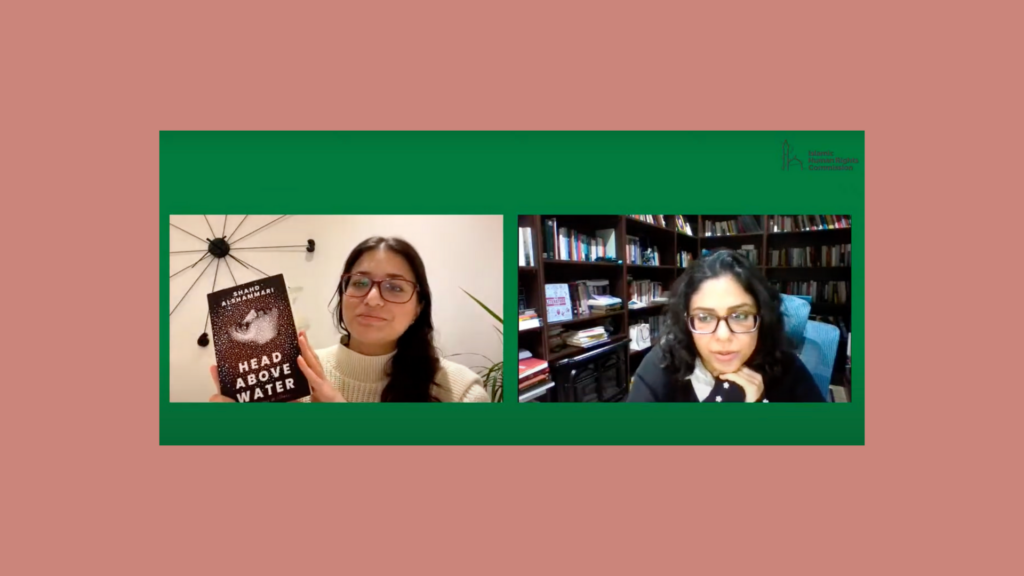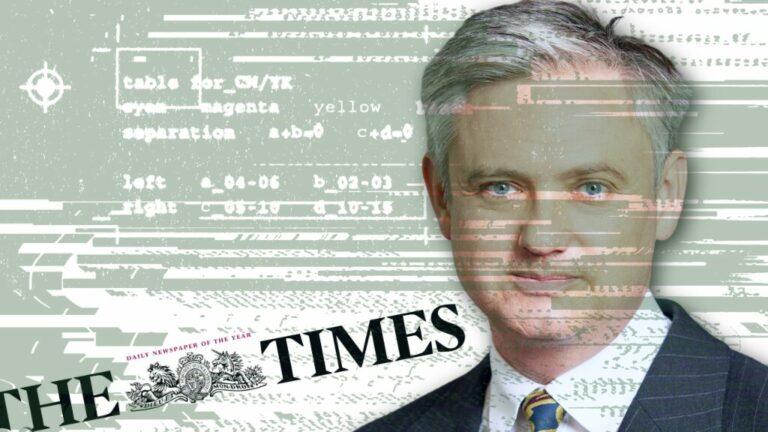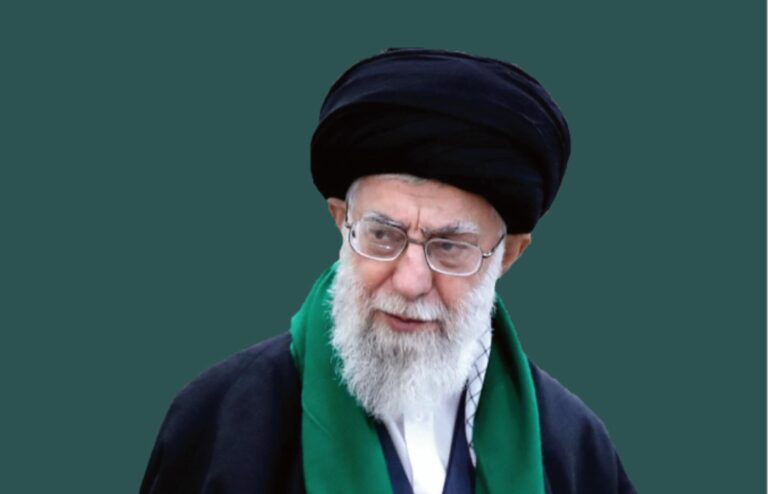IHRC held an online author evening with Shahd Alshammari, to discuss her book Head Above Water: Reflections on Illness.
Purchase Head Above Water from the IHRC Bookshop.
WATCH THE AUTHOR EVENING:
This event was chaired by Mariam Hakim. The conversation has been edited for better readability.
Mariam: I think your book is a great way to learn about illness, disability and even the experience of the Palestinian diaspora that many may not know about. The quote that I liked is on page 34 – ‘illness is a place of exploration. Its a paradocail place of loss and gain’ – essentially that is what I would like to discuss today: loss but also gain and how you look at life and what life can throw at you. Why did you write this book or feel the need to write it?
Shahd: the book Head Above Water is an illness narrative and that its genre, in which I write about my experience having been diagnosed with multiple sclerosis (MS), which I am sure many people in the UK know about. A lot of people in this part of the world [Kuwait] actually have not heard about MS until very recently. MS is an neurological disease that affects many young people – the age group is usually 18 to 35/40. Of course, there are differences geographically, but it is very common and happens very randomly and abruptly.
I woke up one day and I was unable to walk. I was given this diagnosis and it came as a shock; I was 18 years old and never having heard of any illness except the flu. It changed my life. It had lots of difference consequences on how l looked at life, my education, my desire to live, on my connection to God and religion and spirituality. Like all grand things that happen to us – not just illness – it was something I felt needed to be written about. Not just because it happened to me, but because I realised there wasn’t anything out there that actually chronicled illness happening to a woman’s body, especially somebody young. It was not a question of age, growing older, and acquiring multiple health issues towards end of life. It was something so fresh, and I looked everywhere in novels and stories and even movies, but I couldn’t find anything that actually looked at illness happening to us abruptly and not ending in a very tragic and hopeless way. That is how the book came to existence.
I was studying in the UK doing a literature degree. The more I read, the more I realised we did not see these Muslim voices, Arab women’s voices writing these stories. If anything, you are constantly being written about as a background character. I really felt this calling where I didn’t just want to write a story about me, but I wanted people to also start looking at their own experiences. I want young people to find the sense of representation which I think is similar to what you do with your work for children, we can hardly find any sort of representation of Muslim identity in all these things that are very specific, but also very universal. Illness is a universal thing that happens to everyone but it is a topic that is not available for consumption and I felt very lonely and hopeless in the one place that I had found to be my sense belonging which is literature and narrative. Having not found anything there that I could rely on, I decided this is something I really wanted to write.
Mariam: Regarding your identity as a Kuwaiti born person of Palestinian heritage, I felt that came through a lot and found what you had to say about that very interesting. As someone with Palestinian heritage, born and living in Kuwait, how does that impact what you write about?
Shahd: I am born to a Palestinian mother and the experience of diaspora and exile is very traumatic. While I am Kuwaiti, my father is Kuwaiti, I have grown up with this sense of understanding the loss of home and how difficult it can be to continue to survive that trauma. Even with diaspora and navigating a new homeland, there is always this longing for Palestine, for home. I have heard my grandmother (may Allah have mercy on her) has always said, “I want to buried in Palestine”, and unfortunately, that is something that never happened for her. Having heard all of these stories and growing up listening to this love for a country, a nation, a home, and also this longing for a return, I have always thought of how home can be very vulnerable. You can lose home at any point; there is no sense of feeling like I am constantly going to be secure. There is always this sense of being exiled.
I have also thought that home is not just geographical either. Having listened to these narratives, I have realised that home is not just geographical, but you create a home in the new communities that you build, in the new friendships you forge and of course, also home can also be your body – the body that you are born with. Accepting that the body can also exile you with illness, or even if you get a really horrible bout of COVID, and you are left with long COVID, it is a new home that you have to adapt to.
Mariam: could you talk about the stereotypes that the publishers had of you and what you should be speaking about? Here we are talking about being able to verbalise and translate your pain, and when you had written and represented it, what was the reaction you got and how was it received?
Shahd: there is huge burden on Muslim and Arab authors to represent the Islamic identity and present the Muslim identity in a way that many times, is very limiting. They want you to write about issues that are specific to the Muslim experience. There is also this question of “are you still living in an islamic country while still writing in English?”, or, “how can I market you as an Arab Muslim author who is not really talking about Ramadan or other, very specific Muslim experiences?”.
I am dealing with disability as a topic so, it can be very limiting trying to explain that we are basically multiple identities, not just a woman author, not just a disabled author, not just a Muslim author. All these identities are a huge part of me. My struggle with finding a publisher was very long, difficult and disappointing. A lot of times they wanted the narrative to focus more on Islam or the sense of a suffocating environment and wondering why is it that the character in the book has not decided to flee the country or to escape to the west. These themes sell way more: the narrative of the ex-Muslim flees the country, etc. That was not me and not how I envisioned my relationship to my religion or to my native country. But, I did write in English and I wanted my book to be international. It took a long time to find a publisher that valued my book.
Other topics Mariam and Shahd discussed include the Palestinian diaspora, children’s books and education on different bodies and disabilities, feeling of being robbed of dignity when given a diagnosis, the ideal female body and values of beauty, having a disability as a woman and the stigma associated with it, sexist ideologies about women’s bodies only required for reproduction, gender stereotypes of Muslim women, and more.
About the author:
Shahd Alshammari is the author of the recently published book Head Above Water: Reflections on Illness (Neem Tree Press). She holds a Ph.D.in English Literature from the University of Kent (United Kingdom). Today, she is associate professor of literature at Gulf University for Science and Technology (Kuwait). Alshammari specializes in illness narratives and Disability Studies, and has also served as a judge for various literary prizes in the Gulf region and beyond. Her work, some of which can be found on her website, www.shahdalshammari.com, has appeared in Life Writing, Journal of Literary and Cultural Disability Studies, Journal of Middle East Women’s Studies, and other publications. Her collection of stories Notes on the Flesh (2017, Faraxa Press) is being translated into Maltese. The collection deals with disability and women’s issues in the Middle East.






